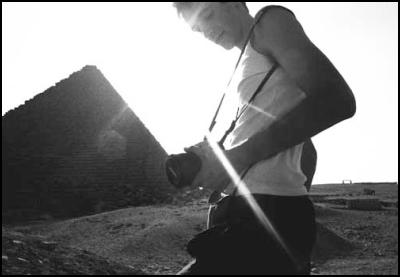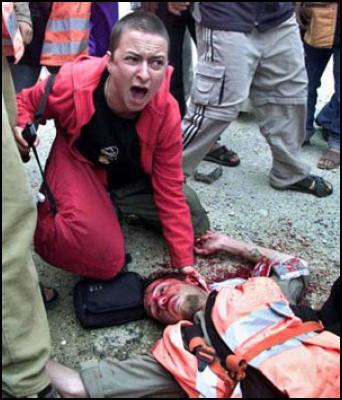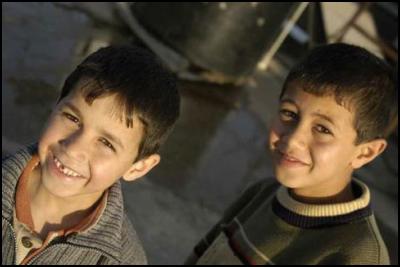Sheila Samples: The Case That Wouldn't Close
The Case That Wouldn't Close
by Sheila Samples
Axis of Logic Contributing Editor
January 16, 2004

Tom Hurndall in Rafah, Gaza Strip, April 2003
"It is from numberless diverse acts of courage and belief that human history is shaped. Each time a man stands up for an ideal, or acts to improve the lot of others, or strikes out against injustice, he sends forth a tiny ripple of hope, and crossing each other from a million different centers of energy and daring, those ripples build a current that can sweep down the mightiest walls of oppression and resistance."~~Robert F. Kennedy (From the Tom Hurndall website)
Tom Hurndall is dead.
Nine months after being shot in the head by an Israeli soldier which left him in a coma, two months after his 22nd birthday, and one day after his mother knelt at his bedside and whispered the good news that his assailant had finally been arrested, Tom Hurndall's name was added to a growing, but mostly unmentioned, unheralded and unknown list of innocents slaughtered by Ariel Sharon's brutal IDF (Israel Defense Forces).
Sadly, neither the young British photographer's meaningful life nor his meaningless death created a discernable blip on the world media screen. April 11, 2003 -- the day an IDF sniper atop a tower in Rafah took careful aim with a telescopic lens and put a bullet into Herndall's forehead -- was just another day in Gaza wherein the streets and alleys of its towns are strewn with the dead, most of whom are guilty of the heinous crime of daring to breathe while Palestinian.

A British peace activist going only by the name Alice cries for help as she holds her hand over the headwound of British peace activist Thomas Hurndall, who had been shot in the head moments earlier, at the start of a protest, in Rafah, southern Gaza Strip, Friday, April 11, 2003. Hurndall, age 21, from Machester, England, had been standing between Israeli troops and Palestinian children when Israeli soldiers opened fire, according to a fellow activist from the International Solidarity Movement who witnessed the scene.(AP Photo/Khalil Hamra)
According to Israeli officials, outsiders such as Hurndall, spurred to action by a love of humanity and by outrage at continuous, brutal, unchallenged attacks upon that humanity, put themselves in the crossfire. They are to blame for their own demise.
Stuff happens. Case Closed.
Hurndall joined the International Solidarity Movement (ISM) peace organization just a week prior to the attack. According to his mother, Jocelyn, entries in his journal indicate that it was obvious from his arrival that it was open season on international peace activists.
"Within his first two hours in Rafah he was shot at repeatedly," she said. " He said they had huge bulldozers coming at them, sand bombs thrown at them and gas..."
It must be true. Just a week before, on April 5, 2003, Brian Avery, 24, from Albuquerque, New Mexico, was critically injured in a hail of machine-gun fire in Jenin from an advancing Israeli armored personnel carrier, although he stood in his orange ISM jacket with arms raised above his head. Eyewitnesses say after shooting Avery in the face, the driver of the APC rolled on by, unconcerned that an unarmed civilian lay in the road behind him in a pool of blood. An IDF investigation revealed it was a regrettable "accident." Case closed.
And earlier, on March 16, 23-year-old peace activist Rachel Corrie, a university student from Olympia, Washington, was crushed to death in Rafah by an Army bulldozer as she attempted to stop the demolition of a Palestinian home. A mere three months later, after a military police investigation, Israel's Military Advocate General, Major General Menahem Finkelstein, found there was no misconduct on the part of the bulldozer driver -- in fact they had been so certain of his innocence, he was back at work the next day, mindlessly destroying the homes and lives of Palestinians. Finkelstein found that Corrie and other ISM victims were guilty of "illegal, irresponsible and dangerous" behavior. Case closed.
What is going on here? Why is there a blanket of silence from countries whose citizens are slain in broad daylight in defiance of international law, backed up with crime-scene photographs and legions of eye-witnesses? Since when does the United States government refuse to investigate the obvious cold-blooded murder of its citizens -- refuse to respond to parents who seek their help? Why are there no bellows of outrage from the British government, not only for Tom Hurndall, but for 54-year-old Iain Hook, who headed the UN program to rebuild Jenin and was shot in the back and killed in November 2002?
Edward Said, Palestinian-born Columbia professor and intellectual conscience of the Middle East, has answered that question many times over. In a penetrating piece in the May 6, 2002 issue of The Nation, Said pointed out, "the monstrous transformation of an entire people by a formidable and feared propaganda machine into little more than militants and terrorists has allowed not just Israel's military, but its fleet of writers and defenders to efface a terrible history of injustice, suffering and abuse in order to destroy the civil existence of the Palestinian people with impunity."

Two young brothers living in the home that Tom Hurndall had chosen to protect, in a photo taken by Tom on 10 April 2003, one day before he was killed. (Tom Hurndall/ISM)
The diabolically astute "let's kill the Palestinians and torture everybody else" Alan Dershowitz seems to back up Said's premise. Dershowitz has come up with a road map to peace he says is guaranteed to curb terrorism. He says -- now, stay with me here -- there's no reason for Palestinians to die one at a time by blowing themselves up. Israel should publish a list of all the villages inhabited by Palestinians -- sort of a "to do" destruction-derby list. Then, any time there's an "act of terrorism," Israel would just destroy an entire village. The inhabitants would be given a couple of hours to vacate their property.
Speaking of property, Dershowitz has an even better idea if the first one doesn't fly. He says Israel could announce in advance that "every act of terrorism will result in an automatic and permanent decrease of a specific portion of the land mass that eventually would constitute the Palestinian state." In the event of a terrorist act, Dershowitz says, that land would be immediately annexed to Israel and become a permanent part of the Jewish state. Neat, huh? Sounds like a plan to me...
With plans like that floating around, is it any wonder that investigations into the deaths of peace activists are open and closed in such a cavalier fashion? Do we not at least sense why the world remains shamefully silent? Palestinians -- and those who would protect them -- are, in Said's words, "nothing but rats and cockroaches that can be attacked and killed...without so much as a word of compassion or in their defense..."
In May 2003, just four months before he succumbed to lukemia, Said met with Rachel Corrie's parents during one of his cross-country lecture jaunts. They told him that, upon returning to the US with their daughter's body, they immediately sought out their US senators, Democrats Patty Murray and Mary Cantwell, and told them their story. After receiving expressions of shock, outrage, and anger as well as promises of investigations, the two legislators returned to Washington. The Corries never heard from them again. The promised investigation simply didn't materialize.
"As expected," Said explained, "the Israeli lobby had explained the realities to them, and both women simply begged off. An American citizen willfully murdered by the soldiers of a client state of the US without so much as an official peep or even the de rigeur investigation that had been promised her family."
Yet, the Hurndalls refuse to remain silent. They refused to accept an initial IDF report exonerating Israeli soldiers from blame. The case of Tom Hurndall became the case that wouldn't close. After relentless campaigning and exerting pressure upon both Britain and Israel, and after launching a months-long investigation on their own, which yielded 14 eye-witnesses, photographs and ballistic evidence, Israel arrested a soldier just one day before Turndall died, charged him with aggravated assault, and promised a "vigorous" investigation.
Even with Israel's dismal track record on investigating its own atrocities, one can always hope that Tom did not die in vain; that he will receive the justice and honor he so richly deserves. And -- by extension -- so will the valiant Rachel, Iain and Brian.
Only then will the case be closed.
Sheila Samples is an Oklahoma freelance writer, a former US Army Public Information Officer and Axis of Logic contributing editor. Reprint permission is granted if it includes name of author and Axis of Logic designation.
http://www.axisoflogic.com/artman/publish/article_4649.shtml


 Binoy Kampmark: The Strawman Of Antisemitism - Banning Protests Against Israel Down Under
Binoy Kampmark: The Strawman Of Antisemitism - Banning Protests Against Israel Down Under Gordon Campbell: On The Coalition’s Empty Gestures, And Abortion Refusal As The New Slavery
Gordon Campbell: On The Coalition’s Empty Gestures, And Abortion Refusal As The New Slavery Keith Rankin: Judaism, Antisemitism, And Israel
Keith Rankin: Judaism, Antisemitism, And Israel Ian Powell: Haka, Hikoi And The Empowerment Of The Kohanga Generation
Ian Powell: Haka, Hikoi And The Empowerment Of The Kohanga Generation Binoy Kampmark: Feeding Chaos - Israel Cripples Syria’s Defence
Binoy Kampmark: Feeding Chaos - Israel Cripples Syria’s Defence The Conversation: News Bargaining Incentive:
The Conversation: News Bargaining Incentive: